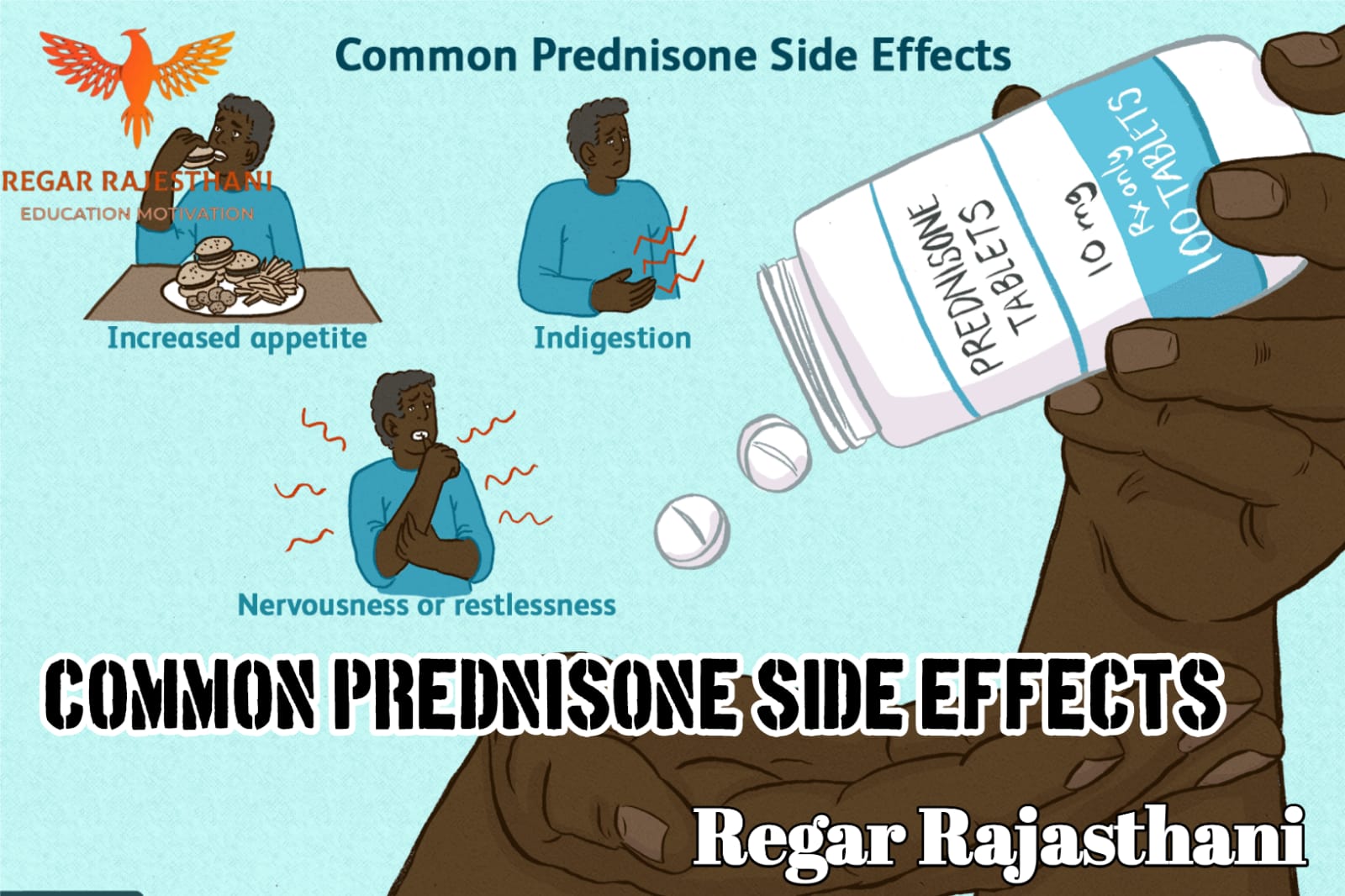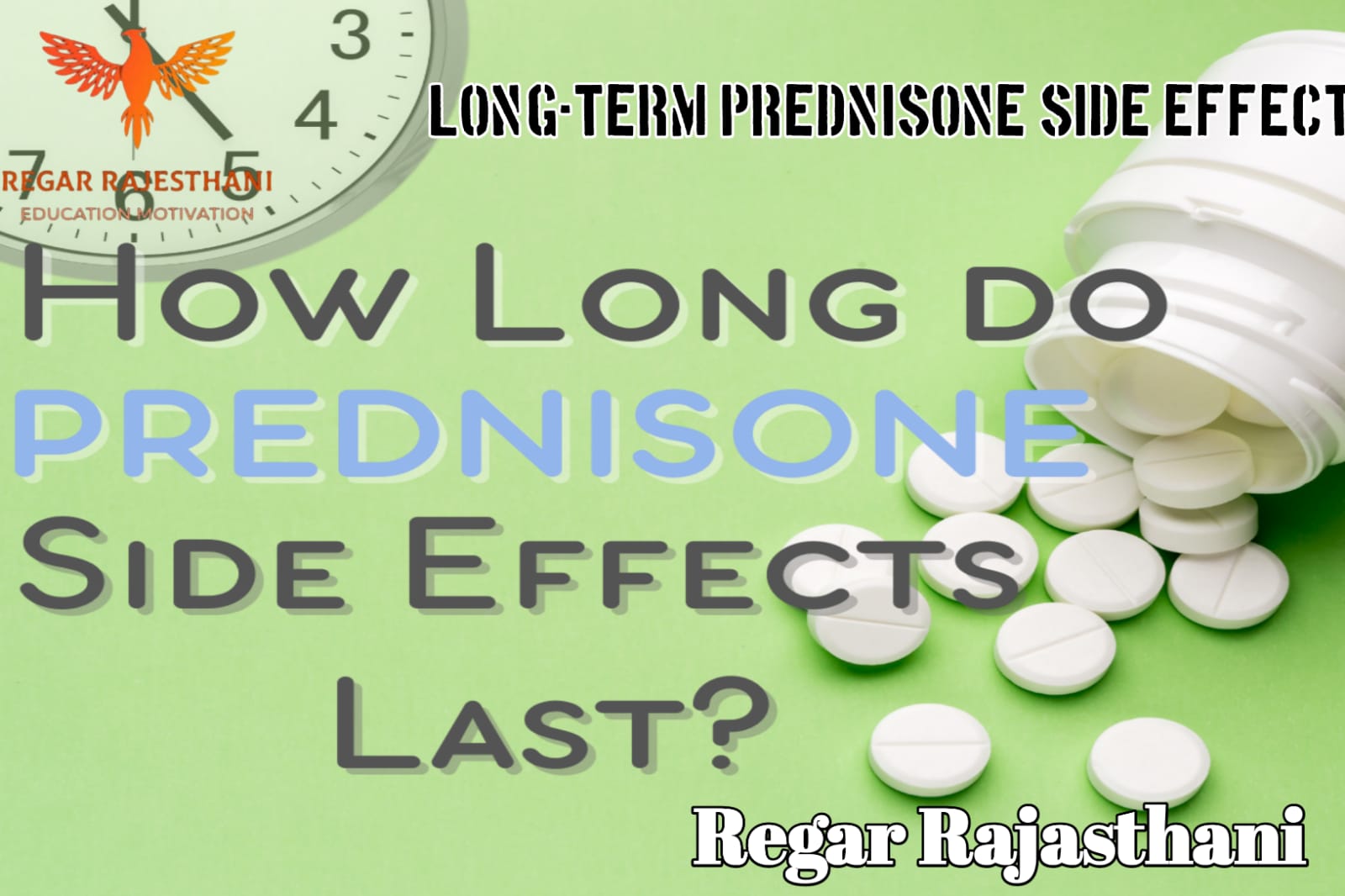Prednisone Side Effects: A Comprehensive Guide
1. Introduction
 |
| Prednisone Side Effect |
2. What is Prednisone?
Prednisone is a synthetic corticosteroid that resembles a hormone produced naturally in the body called cortisol. It works by suppressing the immune system and reducing inflammation, making it useful in treating a wide range of medical conditions.
3. Understanding Prednisone
Before we delve into the side effects, let's have a brief understanding of prednisone itself. Prednisone is a synthetic corticosteroid that mimics the effects of hormones naturally produced by the adrenal glands. It is primarily used to suppress the immune system and reduce inflammation in various medical conditions.
4. Prednisone Side Effects: What You Need to Know
Prednisone side effects can vary depending on the dosage, duration of treatment, and individual factors. It is important to understand these effects to ensure safe and informed use of the medication. Let's delve into the details.
5.How Does Prednisone Work?
Prednisone works by inhibiting the production of certain chemicals in the body that cause inflammation. It helps to suppress the immune system, thereby alleviating symptoms associated with conditions such as asthma, arthritis, allergies, and autoimmune diseases.
6. Long-Term Prednisone Side Effects
Long-term use of prednisone, typically exceeding three months, increases the risk of more significant side effects. It is crucial to closely monitor these effects when using prednisone for an extended period. Here are some long-term prednisone side effects:
Cataracts and glaucoma: Prolonged use of prednisone can increase the risk of developing cataracts and glaucoma.
- Muscle weakness: Prednisone can cause muscle weakness, making everyday activities more challenging.
- Skin problems: Long-term prednisone use can lead to thinning of the skin, increased bruising, and delayed wound healing.
- Increased blood pressure: Prednisone can raise blood pressure levels, potentially leading to hypertension.
- Hormonal imbalances: Prednisone can disrupt the balance of hormones in the body, resulting in menstrual irregularities, decreased libido, or erectile dysfunction.
- Impaired growth in children: Long-term use of prednisone in children can interfere with normal growth and development.
7. Managing Prednisone Side Effects
While prednisone side effects can be concerning, there are strategies to manage and mitigate their impact. It is essential to work closely with your healthcare provider and follow their guidance. Here are some tips for managing prednisone side effects:
- Communicate openly: Inform your healthcare provider about any side effects you experience while taking prednisone.
- Follow the medicine or treatment somebody should have dosage: Stick to the recommended dosage and schedule provided by your healthcare provider.
- Gradual tapering: If you have been on long-term prednisone treatment, your healthcare provider may gradually reduce the dosage to minimize withdrawal symptoms.
- Lifestyle modifications: Maintain a healthy lifestyle by following a balanced diet, engaging in regular exercise, and managing stress.
- Bone health: Ensure an adequate intake of calcium and vitamin D to support bone health while on prednisone.
- Blood sugar management: If you have diabetes, monitor your blood sugar levels closely while taking prednisone and make any necessary adjustments to your medication or diet.
- Infection prevention: Take precautions to minimize the risk of infections, such as practicing good hand hygiene and avoiding close contact with sick individuals.
8. Common Prednisone Side Effects
8.1. Potential Side Effects of Prednisone
While prednisone can be highly effective in treating certain conditions, it's important to be aware of the potential side effects it may cause. These can vary depending on the dosage, duration of use, and individual factors. It's crucial to discuss these risks with your healthcare provider before starting or continuing prednisone treatment.
8.2. Short-Term Prednisone Side Effects
When used for short periods, prednisone may cause the following side effects:
Short-term use of prednisone, typically for a few weeks or less, is less likely to cause severe side effects. However, certain effects may still manifest. Here are some short-term prednisone side effects:
- Fluid retention: Prednisone can cause the body to retain fluid, leading to bloating and swelling.
- Increased appetite: Many individuals experience an increased craving for food while taking prednisone.
- Changes in skin appearance: Prednisone may cause thinning of the skin, increased bruising, or the development of stretch marks.
- Gastrointestinal issues: Prednisone can cause stomach irritation, resulting in indigestion, nausea, or even ulcers.
- Increased appetite and weight gain
- Mood swings and irritability
- Difficulty sleeping
- High blood pressure
- Elevated blood sugar levels
- Fluid retention
- Increased susceptibility to infections
8.3. Long-Term Side Effects
90 Long-term use of prednisone can lead to more serious side effects, such as:
- Osteoporosis and increased risk of fractures
- Cataracts and glaucoma
- Muscle weakness and wasting
- Adrenal insufficiency (suppression of natural cortisol production)
- Increased susceptibility to infections
- Thinning of the skin and delayed wound healing
8.4. Psychological Side Effects
In some cases, prednisone can also cause psychological side effects, including:
- Mood changes, such as anxiety and depression
- Agitation and restlessness
- Insomnia or sleep disturbances
- Cognitive impairment and difficulty concentrating
9. Managing Prednisone Side Effects
While the potential side effects of prednisone can be concerning, there are steps you can take to manage and minimize them. Here are some strategies to consider:
9.1 Communicate with Your Doctor
Maintaining open communication with your healthcare provider is important. Inform them about any side effects you experience, as they can adjust your dosage or provide additional support.
9.2 Follow the Prescribed Dosage
Stick to the prescribed dosage and follow your doctor's instructions carefully. Do not increase or decrease the dosage without medical guidance.
9.3 Gradual Tapering Off
Abruptly stopping prednisone can cause withdrawal symptoms and potentially trigger a flare-up of the underlying condition. Follow your doctor's instructions properly.
9.4 Lifestyle Modifications
Making certain lifestyle modifications can help mitigate prednisone's side effects. These may include regular exercise, maintaining a healthy diet, and getting sufficient rest.
9.5 Dietary Considerations
Some dietary considerations can help manage prednisone side effects. For example, reducing sodium intake may help prevent fluid retention and high blood pressure. Discuss any specific dietary concerns with your doctor or a registered dietitian.
10. Precautions and Interactions
Prednisone may interact with certain medications and substances, so it's crucial to inform your doctor about any other drugs you are taking. Additionally, prednisone may not be suitable for individuals with certain medical conditions, such as fungal infections or uncontrolled diabetes. Your doctor will assess the potential risks and benefits of prednisone treatment based on your specific situation.
11. Conclusion
Prednisone can be a valuable medication in treating various medical conditions. However, it's important to be aware of the potential side effects and take necessary precautions to minimize them. By understanding the risks, communicating with your healthcare provider, and following prescribed guidelines, you can ensure the safe and effective use of prednisone.
Prednisone is a potent medication with the potential for various side effects. While these effects can be challenging, proper management and open communication with your healthcare provider can help minimize their impact. By understanding the potential prednisone side effects and following the recommended guidelines, you can maximize the benefits of the medication while minimizing the risks.
FAQs
11.1 Can prednisone cause weight gain?
Yes, one of the common side effects of prednisone is increased appetite and weight gain. It's important to maintain a healthy lifestyle and discuss any concerns with your healthcare provider.
11.2 Are there natural alternatives to prednisone?
While there are natural alternatives that can help manage certain conditions, it's crucial to consult with your doctor before making any changes to your treatment plan. Natural alternatives may not be suitable for everyone or provide the same level of effectiveness.
11.3 How long do prednisone side effects last?
The duration of prednisone side effects can vary depending on factors such as dosage, duration of use, and individual response. Short-term side effects may subside once the medication is discontinued, while some long-term side effects may persist even after stopping prednisone.
11.4 Can prednisone affect sleep patterns?
Yes, prednisone can cause sleep disturbances or insomnia in some individuals. If you experience sleep-related issues, consult your healthcare provider for guidance.
11.5 What should I do if I miss a dose of prednisone?
If you miss a dose of prednisone, take it immediately or soon as you remember. However, if it's close to the time for your next scheduled dose, skip the missed dose and continue with your regular dosing schedule. Don't take a double dose because you missed one.
What are the most common short-term prednisone side effects?
- Some common short-term prednisone side effects include fluid retention, increased appetite, changes in skin appearance, and gastrointestinal issues.
In How much time does it take for prednisone side effects to go away?
- Prednisone side effects typically diminish once the medication is discontinued. However, the duration can vary depending on the individual and the length of treatment.
Can prednisone cause weight gain?
- Yes, weight gain is a common side effect of prednisone due to increased appetite and fluid retention.
Are there any precautions to take while on prednisone?
- It is essential to follow your healthcare provider's instructions, monitor your symptoms closely, and attend regular check-ups. Additionally, inform your healthcare provider about any other medications or supplements you are taking to avoid potential drug interactions.
Can prednisone affect sleep patterns?
- Yes, prednisone can cause insomnia or difficulty sleeping in some individuals.
What should I do if I experience severe side effects while on prednisone?
- If you experience severe or concerning side effects while taking prednisone, contact your healthcare provider immediately for guidance and possible adjustments to your treatment plan.





.png)




0 Comments